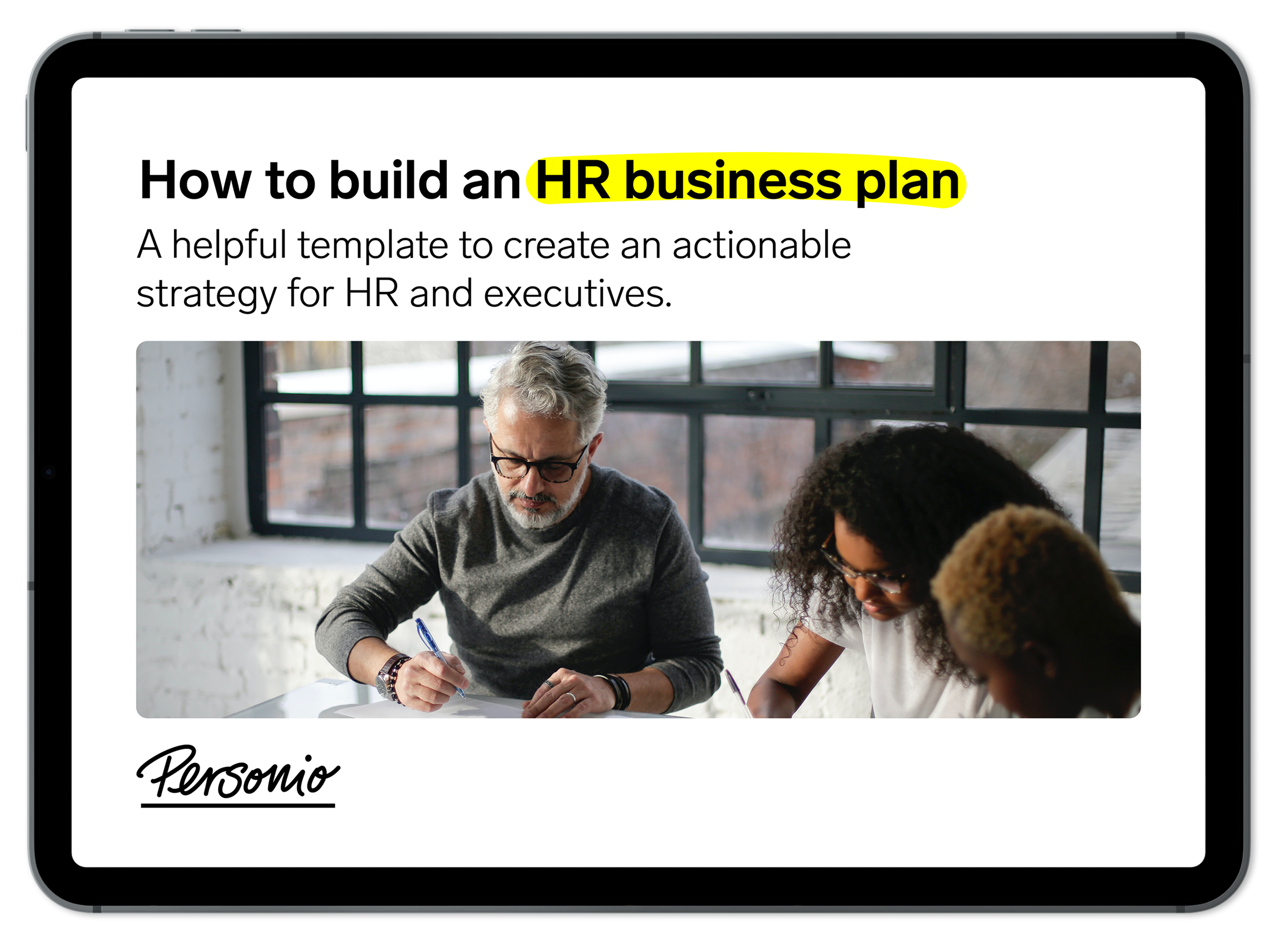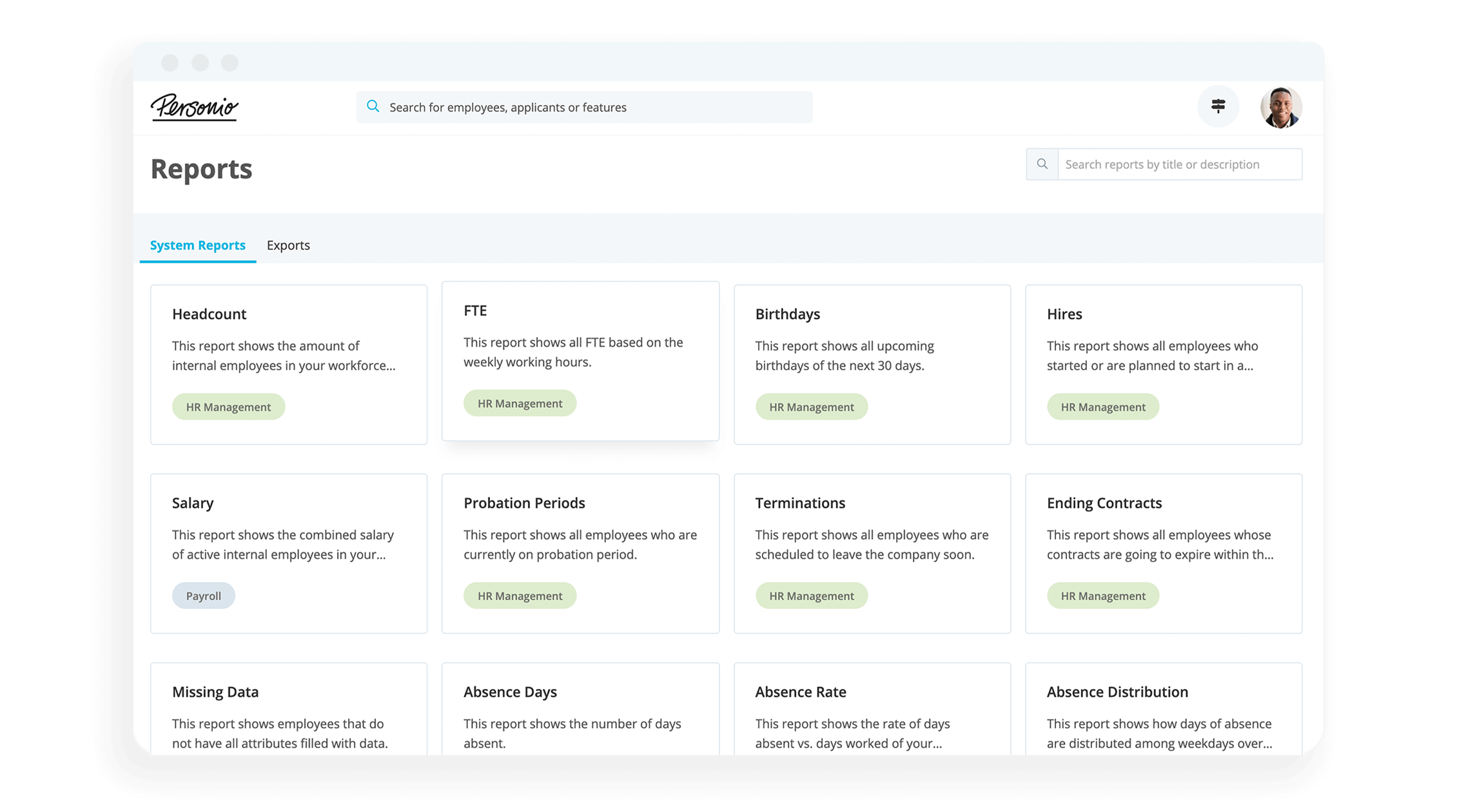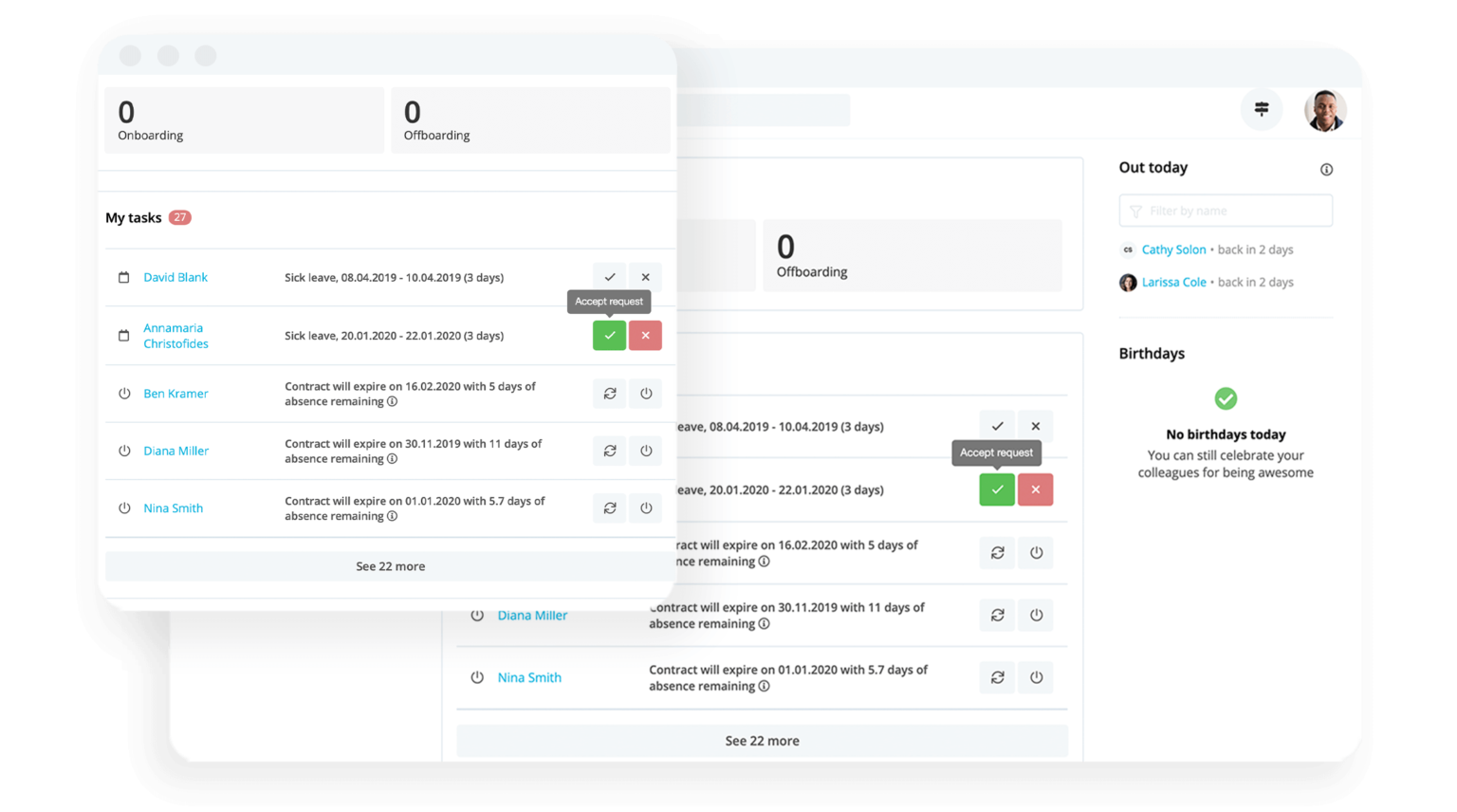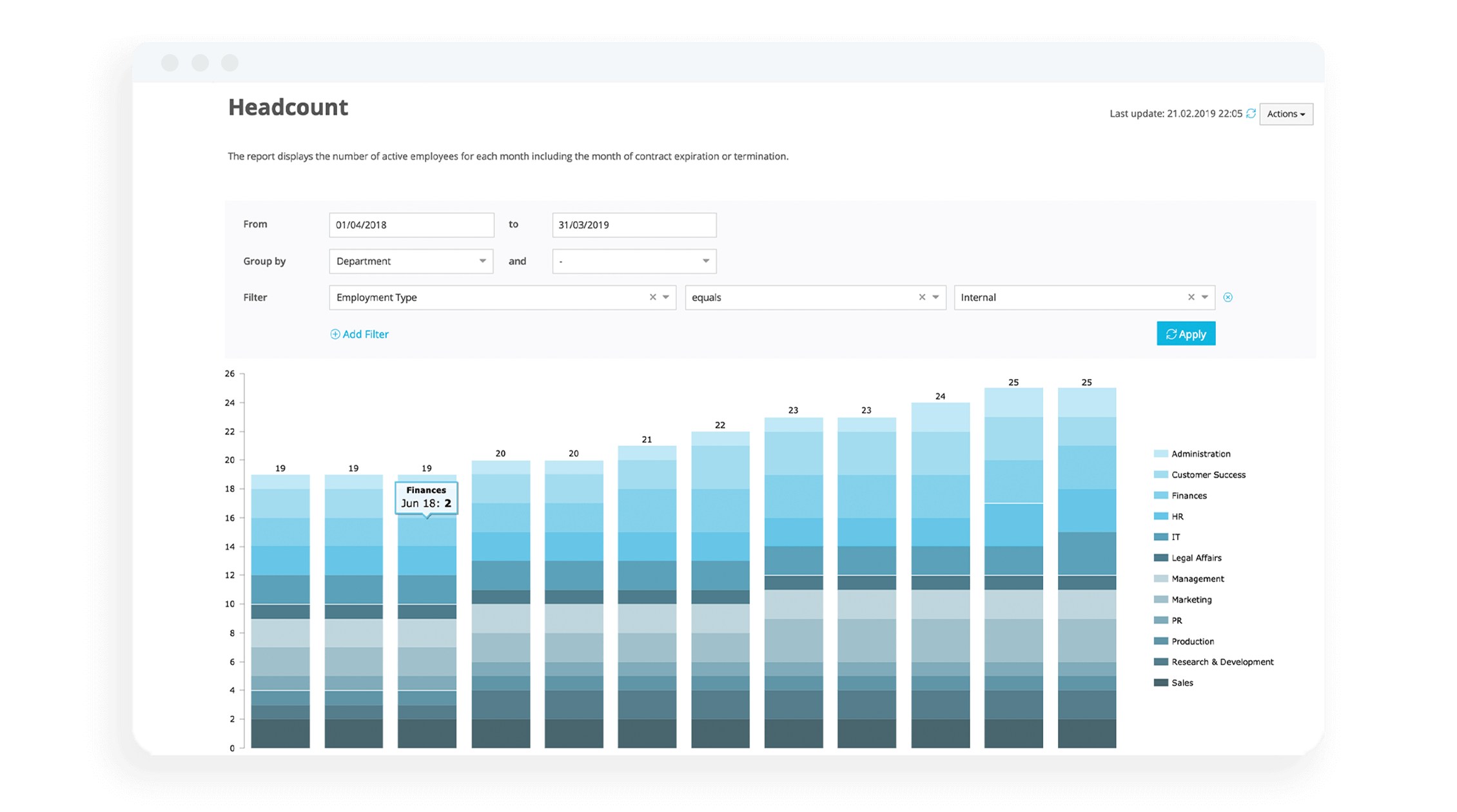What is an HR Business Partner (HRBP)? Tasks & Role Explained

An HR business partner (HRBP) is a human resources professional who helps align an organisation’s people strategy with their business strategy. They ‘partner’ with senior leadership through specialised knowledge that helps create policies and programmes in line with an organisation’s goals and objectives.
Every successful organisation needs an HR business partner (HRBP). If you're an organisation interested in unlocking your productive potential, investing in an HRBP should be your next big move.
What does it take to become one? Is there a model for success? What skills do they need to succeed? We’ll answer all of these and more in the following article.
Become an HRBP with Personio’s help. Book a demo to help build the business case.Key facts about an HRBP
An HR business partner (HRBP) is an HR professional who helps align an organisation's people strategy with their overall business strategy.
The role of an HR business partner is to serve as a critical link between an organisation's workforce and their business model.
Common duties of an HRBP include strategic policy creation, line manager and leadership training and other tasks requiring specialised knowledge.
What does an HR business partner do?
As a strategic advisor, an HRBP bridges the gap between human resources (HR) and the business. They act as a trusted advisor to both employees and leadership, ensuring that HR practices align with and support the organisation's overall goals.
In essence, an HRBP helps:
Attract and retain top talent
Improve employee engagement and productivity
Minimise legal and compliance risks
Achieve their overall business objectives
Building that out, here is what an HRBP is typically tasked with doing:
Partners with business leaders: HRBPs work closely with department heads and executives to understand their unique needs and challenges. They then translate those needs into actionable HR strategies and initiatives.
Develops and implements HR programs: This includes everything from talent acquisition and onboarding to performance management and employee relations. HRBPs ensure that these programs are effective, compliant, and aligned with the organisation's culture.
Provides expert guidance: HRBPs offer specialised knowledge and advice on a wide range of HR topics, including compensation and benefits, legal compliance, and employee engagement.
Acts as a sounding board: HRBPs serve as a confidential resource for employees and leaders to discuss concerns, brainstorm solutions, and navigate complex situations.
The 5 core tasks of an HRBP
In general, what might an HR business partner be asked to do? Their work tends to cover the following:
Core task | Why it matters |
|---|---|
1. Strategic control Of HR processes | HRBPs are equipped with the strategic vision to identify bottlenecks early on and run efficient, smooth recruiting and hiring processes. |
2. Staff development & coaching | An HRBP provides tailored professional development and training initiatives for managers and employees. |
3. Collaboration with executive management | An HRBP would be tasked with keeping a clear view and actively helping to shape the future of a company. |
4. Taking charge Of change | HRBPs are essential drivers of change in an organisation, taking charge of the entire change management process and optimising it. |
5. Employer branding | An HRBP would be tasked with putting particular focus on bringing corporate culture to life to attract and retain top talent. |
1. Strategic control of HR processes
Employees are a company’s most valuable resource and the current shortage of skilled professionals constitutes one of the greatest challenges in HR. HRBPs are equipped with the strategic vision to identify bottlenecks early on and run efficient, smooth recruiting and hiring processes.
Beyond that, HRBPs manage employee retention from a basis of sound people analytics data: After all, high turnover rates are one of the major cost drivers within most companies.
2. Staff development & coaching
Once the right employees have been brought on board, HRBPs ensure that they stay on course and help to move the company forward.
For this, it is crucial that HR provides tailored professional development and training initiatives for managers and employees. These not only drive productivity but are also essential for the company’s ability to add value.
Employees who feel appreciated and whose development is supported within the company are much less likely to search competitors’ recruiting pages.
3. Close collaboration with executive management
As an HRBP, your role goes well beyond that of an internal service provider. Instead, you are executive management’s direct point of contact for anything to do with planning and meeting HR requirements.
You work with razor-sharp management accounting tools and reliable data to support the executive management team in major decisions such as:
How many new employees will need to be recruited?
Which skills are lacking within the team to maintain an edge over competitors?
You are the one who keeps a clear view and actively helps to shape the company’s future.
Help your HRBP to unlock executive buy-in

Download our HR Business Plan Template to help your HRBP pull together a plan that earns executive support.
Get the template4. Taking control of change processes
The ever-increasing number of challenges people in HR are confronted with is clear evidence of just how important it is to digitalise. Professional roles need to be reconsidered, a new dynamism needs to be injected into established working structures and processes such as recruiting and onboarding need to be made accessible online.
Interested in learning more about change management processes? Click here to read our definitive guide, with examples to help illustrate how to do so effectively.
This is where HRBPs are essential drivers of digitalisation, working closely with executive management and confidently taking control of change processes.
5. Employer branding
And last but not least: As an HR business partner, it is up to you to bring your company’s corporate culture to life and ensure that it supports growth.
At the same time, it is also your job to communicate your corporate culture and everything to do with it to the outside world. Why? This is strategically essential if you want to recruit the best available employees, both in today’s highly competitive market and in the future.
How can companies benefit from having an HRBP?
Companies that embrace the strategic role of HRBPs unlock a wealth of benefits, transforming HR from a cost center to a vital contributor to organisational success.
Here's a compelling breakdown of the key advantages companies gain from having an HRBP:
1. Enhanced strategic alignment
Problem: Traditional HR functions often operate in silos, disconnected from business goals.
Solution: HRBPs bridge the gap, translating business needs into actionable HR strategies, ensuring alignment with the organisation's overall objectives.
2. Talent acquisition and retention
Problem: Recruiting and retaining top talent is a constant challenge in today's competitive market.
Solution: HRBPs develop strategic talent acquisition plans, fostering a positive employer brand, and crafting comprehensive onboarding and retention programs.
3. Improved employee engagement and productivity
Problem: Disengaged employees lead to decreased productivity and higher turnover costs.
Solution: HRBPs work collaboratively with leaders to create a positive work environment, fostering employee engagement through effective communication, recognition programs and opportunities for professional development.
4. Mitigated legal and compliance risks:
Problem: Non-compliance with labor laws can lead to costly fines and reputational damage.
Solution: HRBPs stay updated on evolving regulations and advise leadership on best practices to ensure compliance, minimising legal risks.
5. Optimised cost management:
Problem: Inefficient HR processes can lead to unnecessary expenses.
Solution: HRBPs analyse HR data to identify cost-saving opportunities, streamline processes, and implement cost-effective solutions.
By investing in an HRBP, companies gain a strategic partner who can significantly contribute to their bottom line and drive long-term success.
What is HR business partnering model?
This is the model by which we can understand and realise HR’s role as a strategic force within an organisation. In order for this to happen, an organisation needs to rethink the way they position their People Team and how they are viewed in the greater organisation.
What is an HRBP's role in an organisation?
The role of an HR business partner is purely strategic. Whether it concerns HR for startups or large organisations, they are less focused on common administrative tasks and more focused on driving strategic projects that make a difference for organisations.
Let’s take a recent example and explore it: the Covid-19 pandemic. In a traditional organisation, an HR person may have functioned in a purely administrative role. But almost overnight, they were expected to:
Look after teams of people working from home across virtual networks
Deploy smart HR technologies
Ideally they would flourish, mobilise previously-unknown strengths and uncover their hidden potential. Or due to the amount of administrative work on their plate, they may flounder.
For an HR business partner, strategic work and crisis scenarios like these are second nature. In a time like the pandemic, they’d have both the mental capacity and time to understand what’s happening in the business, where leaders currently stand and what decisions they need to make (and how to make them).
When done correctly, each of these decisions can add immense value in a time of crisis. This is because they are not simply trying to keep their head above water, but playing their part in business success.
Utilise an HR software designed for HRBPs

See how Personio can upgrade your people operations now and into the future.
Book your free demoHow can you become an HRBP?
First of all, you can do so by developing a new mindset. The attitude toward human resources must change – from viewing it as an internal service that administers staff to appreciating it as a provider of added value that actively shapes HR processes.
This step requires courage, a commitment to change and a readiness to step away from well-trodden paths from all stakeholders. Digitalisation is both necessary and here to stay – and HR can do so much more than just deal with ad hoc issues. It’s time for HR to evolve as a business partner with:
Evolution | Explained |
|---|---|
Greater decision-making | As a sounding board for management |
Increased financial resources | To make strategic investments. |
Efficient HR tools | To assist in digitisation (like HR software). |
A refreshed image | Shaping processes rather than handling them. |
HRBP skills
To thrive as an HR Business Partner, you'll need a unique blend of skills.
Business acumen and strategic thinking are essential to translate business needs into actionable HR initiatives and measure their impact.
Strong communication and relationship-building abilities allow you to collaborate effectively with diverse stakeholders and build trust.
Problem-solving, data analysis and digital literacy equip you to tackle complex HR issues and leverage data for informed decision-making.
Finally, continuous learning ensures you stay up-to-date on evolving trends and best practices in the HR landscape.
Mastering this diverse skillset empowers you to become a strategic partner driving organisational success.
The role of an HRBP in everyday HR
The following three aspects are essential if HR is to take on its role as an HR business partner successfully:
The executive management’s determination to undergo a paradigm shift
The future HR business partner’s assertiveness and commitment to take on responsibility and familiarise themselves with new tasks and tools
Thorough planning and consistent implementation
A haphazard approach to a paradigm shift won’t work. If HRBPs are to leave the domain of routine administration behind and start working strategically, they need time to do so. They can make this time by building better, more automated HR processes, that almost run on their own.
After all, HR teams still spend an incredible 42% of their time on administrative tasks. It’s high time that HR business partners be taken seriously in their new role as valuable formative forces and be put at the helm.
If the right environment is created, vast benefits can be reaped, both for corporate success and employee satisfaction, let alone for you as HRBPs – in times of crisis and beyond.
HR software and HRBPs
WATCH: Get to know Personio in one minute

We need your consent to load this service!
This content is not permitted to load due to trackers that are not disclosed to the visitor.
HR software can help empower HRBPs to become even more strategic and impactful partners within their organisations.
These tools go beyond automating routine tasks and offer a multitude of benefits:
Data-driven decision-making: HRBPs can leverage HR software to gather and analyse vast amounts of workforce data, gaining valuable insights into employee engagement, talent acquisition trends and performance metrics.
Streamlined processes and improved efficiency: HR software automates routine tasks such as payroll processing, benefits administration, and applicant tracking, freeing up valuable time for HRBPs to focus on strategic initiatives.
Enhanced communication and collaboration: HR software offers tools across the entire employee lifecycle that enhance communication and collaboration in recruitment, onboarding, performance, engagement and more.
Personio is an all-in-one HR software designed for every stage of the employee life cycle.
Using Personio, you can manage all your most important HR processes from one place. Recruit, manage, develop and pay your employees from one centralised HRIS, attuned to an HR software pricing that makes sense for your organisation.
Speak with an expert today about your HR needs and how Personio can meet them. Or, give Personio a spin for yourself by starting your very own free trial right now. It’s all yours for 14 days.


